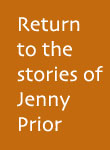

 |
 |
 |
 |
 |
 |
 |
 |
 |
 |

Bub and Honey
That’s
right. He’s Bub, and she’s Honey. Possibly, this doesn’t sound
true, but it is. They aren’t nicknames, or short forms, or methods of
torture inflicted by name sadists. Bird and Ethel Whitley (I mean, come on)
earnestly called their one and only son Bub Healey. And over here, well, look,
it’s Judge Milton Cherry and his lovely wife Martha tenderly and without
a drop of sarcasm filling out the birth certificate for their squalling baby
daughter, Honey June.
Please
don’t ask. Any explanation would just not do.
Perhaps
there are thoughts of polka dots and county fairs and round cheeks and no
education, but they spring from superficial judgements and are incorrect.
Think, instead, of grad school, drug addiction, ripped sweaters and cat scratches.
And before that, not of homecoming queens and tractor races but of highballs,
extramarital affairs and very thick carpets which greatly reduce the impact
of hard falls down stairs.
Bub
and Honey, both from the same town, born three hours apart, were married at
nineteen just to get out. They went to architectural college together, dropped
out together, and lost a tiny son together at twenty-one. Both jobless, this
period of their stuck-together life was spent indoors. They smoked constantly.
They relentlessly drank water. Honey began to feel like a lake or a river,
rippling and liquid. She was a giant, messy spill. Bub simply felt drained
no matter how often he filled and refilled his glass from the disgusting tap.
He was empty.
Now
see them in their middle age; they are forty-nine and have each other. He
is making fun of her again, for the billionth time, literally. He is mocking
her serious attitude and her ironed jeans. But she knows that he loves her
kind laugh and her long, smooth legs, and the feel of her fragile arms as
he holds them hard, above her head, not as often as he used to, but often
enough, considering their age and the sheer amount of time they have spent
together. She likes the swollen marks this leaves on her skin, for hours afterwards.
He’s
a stockbroker now, of all things, he deals with money and power and peoples’
futures each day and then comes home and is a bit cruel to her—she supposes
it’s residual work life spilling over briefly—and then, when poking
fun or slightly worse is done, there’s supper, and kind words, and talk
of their son Bradley, who’s in the army of all things, hair shorn sharply
where it used to roar around his head. He isn’t doing anything dangerous,
yet. When Honey had Bradley growing and becoming Bradley inside her she had
felt compelled to wear sandals, regardless of the weather. She had needed
her feet to be free. She could squirm her toes around without burden, there
were no barriers keeping them still. The nails were painted brightly and always
thoroughly, chipless, as if to compensate for the absence of a legitimate
covering substance. Bub had to force her to put on boots when the wind got
bitter and snow dotted the ground.
Bradley
doesn’t like this story. It makes his mother seem flighty and unsure,
a wacko, almost. Privately, he’s harbouring the deep suspicion that his
parents are truly insane, that there is little keeping them from blowing their
collective cover to the rest of society and, most importantly, to him. During
his high school years he reluctantly welcomed a constant pulsating rush of
teenage visitors, mainly due to Honey’s fridge contents and the fact
that they had a pool. The running joke was that his parents were brother and
sister. Bub and Honey do sort of look alike, and are from the same place,
and are weird. Not weird like all parents are weird, but something extra.
Something impenetrable. Bradley used to laugh along with the troops of friends
and semi-friends; he didn’t feel like a traitor until he was twenty-two.
When the ugly realisation kicked in, a faint but permanent ache appeared somewhere
in his chest and settled there, and even still he can’t forgive himself.
He loves his parents so forcedly that he actually cries out in pain sometimes
while thinking about them. It’s awful. He wishes there were other children.
"But
why, honey?" his mother asks (it’s strange to hear her utter her
own name as an endearment). "Aren’t you glad we can pass on all
our affection to you?"
"And
our money?" his father will offer. It’s his joke, every time. It
gets so tiresome.
Bradley
keeps in touch with Darren by phone. She’s a girl he dated briefly when
they were both sixteen. Darren still lives with her mother and works at one
of the big video store chains. At Bradley’s request she gives him reports
on his parents, but sometimes he has to stop her before she finishes.
"So,
I saw your mom and dad the other day. They were looking at the kittens in
that pet store window on Woolcott. Your mom was freaking out a bit—it
kind of looked like she was crying—"
"Jesus,
okay. I didn’t need to hear that. Can’t you tell me something nice
about them? Something encouraging?"
"Um,
yeah, they came into the store about a month ago and rented a whole bunch
of film noirs. They seemed relatively happy. Although your dad was wearing
this really bizarre kind of dress-like thing and your mom seemed pretty tense
while they were at the counter because she —"
"Darren."
"Sorry.
It was no big deal. They’re fine, same as usual. What are you so afraid
of?"
He
doesn’t know. It’s not something he can express. His parents have
survived without him for many years and will most likely do so for many to
come. Nevertheless, he’s uneasy. His father can be so mean-spirited,
and his mother so…well, so off. The two of them are gangling together,
at odds but unmistakably connected, like a series of limbs that are attached
to each other but shouldn’t be—an arm to a leg to a leg, or something.
There’s nothing neat, or precise, about them. Hard to contain and hard
to fathom. Bradley thinks things might someday get out of control but he doesn’t
know what is meant by this, exactly. It’s just a sense of foreboding
he has, a shadow that slips over him greyly from time to time, filling him
with dread.
He
tells Darren to change the subject, to talk about something else. She’s
a bit miffed, and rightly so, but she’s used to it because this is the
way all their conversations go. Darren knows Bradley primarily calls to get
information about his parents which ends up upsetting him. What can she do?
As people go, Bub and Honey happen to exhibit disturbing behaviour more often
than not. That’s just the way it is.
Bradley
also calls for nostalgic purposes. Memories must comfort him in his cold,
creaking army cot. He’s stranded, helpless, unfulfilled among other misguided
individuals. Or this is what Darren imagines. Because she works in the service
industry, she spends most of her time trying to help people while secretly
hating them. Dealing with Bradley is pretty similar. Not that she hates him
(she still loves him, in fact), but she resents him for using her this way.
But she also is programmed to please, so she now talks about walking by their
old public school to satiate his hunger for the past. Darren tells Bradley
that it was sunny but brisk, and that she wandered around the field of Elmwood
Heights, just on the other side of the fence, and that there were kids racing
around the track, jumping on each other in that violent-friendly way. It had
seemed so cut-throat, she says. The whole meaning of school, the competition,
the preparation for the real world. But school was so much crueler than the
real world, they both agree.
Darren
lies in bed every single night and thinks about Bradley and Bub and Honey.
About the time Bub lunged for her in the kitchen that summer afternoon, Darren
in her bright green bikini with white goosebumps all over her skin because
of the air conditioning. Bub in his cream work slacks and maroon dress shirt,
first two buttons undone—his day was over now—and still-black chest
hair creeping nastily out. So many colours, but none of them complementing
each other. The soft blue of the room served to make the experience even more
surreal, Darren remembers. Soothing, almost. And the culinary items proved
advantageous. The blender, clean and unplugged on the counter, came in handy
for brandishing at Bub, right after his surprisingly tiny tongue made its
way between her shivery lips.
Bub stepped back, as if dazed from a blow, although Darren hadn’t hit
him. She’d merely hissed "Don’t", twice, and grabbed the
blender and dangled it over his head. A funny choice, in retrospect. Neither
of them laughed, of course. Bub immediately turned and shuffled out of the
kitchen, like a dog or a child who has been told to get, now. Off with you.
Darren stayed motionless, blender in hand, for what appeared to be a very
long time, until Honey wandered in and asked brightly if Darren was thinking
of making a milkshake or a root beer float. Go ahead, sweetie, it’s a
perfect time of year. But make some for all of us.
Darren
also thinks about the time she and Bradley and Bub and Honey sat in the family
room, watching a horror movie marathon that started at 3 o’clock in the
morning. Usually strict about youthly affection (but hadn’t they been
teenage lovers?), Bub and Honey permitted Darren and Bradley to sprawl entwined
on the huge, padded rocking chair. Stiffly parent-like, they stationed themselves
on the couch, nearly a foot apart. But as light began to creep through the
curtains, Darren noticed them moving gradually together. Bradley eventually
slept, and Darren compulsively watched Bub and Honey, watched their strange,
slow dance toward one another. It looked like they were fighting contact,
but were helpless in the face of an unseen force that painstakingly drew Bub’s
hand to Honey’s knee, and Honey’s small, vulnerable head to Bub’s
shoulder. Every few moments Darren forced herself to look away, to consider
Bradley and his blissful, unconscious ignorance of this painful intimacy.
This vision still makes Darren toss restlessly under her blankets, years afterward. She knows that her mother is wakeful in the master bedroom down the hall, fretting about her divorce after twenty-eight years of marriage, and the fact that her daughter still hasn’t moved out and works a dead-end job. Somehow, her mother’s anguish is more comforting to dwell on than Bradley and his parents. Darren really doesn’t know why.



All content, concepts, images, audio, video and text are the exclusive copyright of Chunder, Logger & Ladstein, Entertainment that's Raw, and cannot be reproduced, reused or publicly disseminated without express written consent. All content posted by Slipsindoum citizens or visitors remains the property of the original creator.
©1996 - 2003 C.L.L. Entertainment
